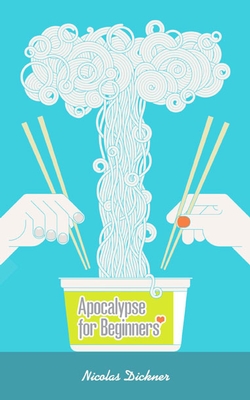So I am very far behind on reviews, but I wanted to at least get on the board in August. This book was actually read a few months ago.
Apocalypse for Beginners is Nicolas Dickner's second novel, after Nikolski, which I reviewed about a year ago. My basic feeling was that it (Nikolski) started pretty strong, but that it spun out of control towards the last third or so. The characters from three storylines didn't interact much or in a particularly interesting way when they finally did criss-cross towards the end. I guess I didn't want some contrived Crash-like scenario, but it probably would have been better to just skip over their meeting rather than what Dickner came up with. (As a total aside, I felt Nick Hornby's How to Be Good followed the same pattern of fairly strong start and then a long detour into implausibility and then a pretty damp squib of an ending.)
Well, Apocalypse for Beginners sort of inverts the pattern. The beginning is super contrived: Hope Randall comes from a long line of prophets, all of whom were convinced the world would come to an end on a specific day (shades of Heaven's Gate -- in fact, there is a whole page on Wikipedia dedicated to the various dates prophets gave for the end of the world -- fascinating). When the date came and passed, her relatives became deeply depressed and typically suicidal. So where I have a bit of a problem is that this seems like a genealogical line that would have been snapped a while back.
Once you get past that, things pick up a bit. Hope and her mother move to town, roughly at the start of Hope's high school years I vaguely recall. Hope is more or less abandoned by her mother and spends much of her time with a neighbour, Mickey Bauermann, and his fairly normal family. Hope is super logical, so Mickey believes she has avoided the family curse.
I don't think I am spoiling too much by saying she eventually succumbs. Also, I know I am not giving anything away by saying that her mother gets increasingly frantic as her personal date approaches, and then more or less collapses after it passes uneventfully. Hope has to work extremely hard to keep her mother from OD'ing on pills. Her mother eventually pulls through and finds employment as a bartender at some dive where she can get fairly pissed each night. Whatever works, I guess.
One thing that I did like about the first half (or even two-thirds) of the book is the fact that Hope is clever at school and is generally a good influence on Mickey. It is a bit difficult to believe that he never made a move on her, though it was clearly on his mind from time to time. Another aspect that rang true was how obsessed Hope was with nuclear war. It's retreated a lot from the front of my mind, but I was just convinced that Reagan was going to embroil us in a real hot war. Thank goodness it wasn't Reagan vs. Putin, since that could have gotten really ugly. I've already written how this existential threat coloured my general disposition. I suppose for a certain group of environmentalists the possibilities of war over natural resources, particularly water, the coming of peak oil (which they largely welcome) and the consequences of global warming have the same impact on their psyches. I do care about these things and worry about them a fair bit, but I am just exhausted with day to day life most of the time and can't afford to dwell on them to the same extent that a teenager can...
SPOILERS AHEAD
I've sort of forgotten why Mickey never tries to date Hope, but she goes off to Japan (to teach English I think). Why Japan? It has something to do with how her date was revealed to her. Mickey does not go into the family concrete business and in fact moves to Toronto. He goes through a number of unsatisfactory relationships, and his mother despairs of him settling down and raising some kids. (She can't quite admit to herself that her other son is gay.) Mickey comes back for a funeral, and has an epiphany: Hope's doomday date is approaching and he decides he will try to track her down and 1) offer her comfort and 2) see if they are in fact destined for each other. (While the tone is different, this return to his hometown sort of put me in mind of the start of movie The World's End.)
What sort of bugged me about the book is that it ends without a proper resolution. (It actually reminded me of Murakami's After Dark in this respect.) The book works so hard to bring these two together, setting up the readers' expectations. Either this should come to pass, or some other ending where the two learn just why they can't be together is required. Cutting off too early is just not cool. So I can't really wholeheartedly recommend the book, though it does have its moments.
Maybe third time will be the charm, though I have to say I have a lot of other books to read before I would ever get back 'round to Dickner.

No comments:
Post a Comment